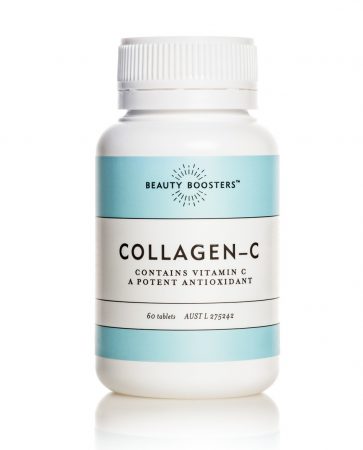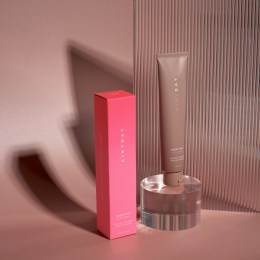From skincare to supplements, collagen products make up a huge chunk of our industry. Whether they physically contain collagen or are designed to stimulate our body’s own natural production, these products play a vital role not just in anti-ageing but preventative beauty routines and even health concerns such as joints and muscles.
With collagen making up about 75% of our skin, plus statistics showing us that our natural supply of collagen decreases around 2% per year by our mid 20s, and over half lost by our 50s, it’s no wonder that collagen products are so staggeringly popular at the moment.
For supplements and beverages that contain collagen as their hero ingredient, this is generally hydrolysed marine or bovine collagen carrying a low molecular weight which can be readily absorbed by the body. But what about other products that don’t actually contain collagen but simply encourage the formulation of our own?
These often contain a handful of ingredients that are demonstrated to optimise or speed up our natural collagen production, even after this natural function has significantly slowed down due to age. So what are some of these collagen-loving ingredients? According to experts, including Dermatologist and co-founder of Bespoke Skincare; Dr Katherine Amour, these include:
- Retinoids (vitamin A derivatives – retinaldehyde, retinol, retinal, tretinoin)
- Niacinamide – Vitamin B3
- Ascorbic acid – Vitamin C
- Alpha and poly-hydroxy acids (AHAs and PHAs)
“Retinoids treat and prevent aging by inhibiting the breakdown of collagen in our dermis (from sun and other environmental exposures such as pollution and cigarette smoke) and stimulating fibroblasts (the ‘powerhouse in the dermis’ which produces our skin’s collagen) to increase collagen synthesis,” says Katherine.
“Niacinamide stimulates fibroblasts to produce collagen, elastin and other skin-plumping fibres. Ascorbic acid both preserves and improves stability of existing collagen, and increases production of collagen in both youthful and aging fibroblasts in the skin, and AHAs/PHAs smooth the skin via exfoliation. They increase dermal production of skin plumpers including collagen and glycosaminoglycans, as well as improving the quality of elastin fibres. All good news for combatting wrinkles. PHAs are often better tolerated than AHAs in those with sensitive skin.”
Emma Hobson, Education Manager for Dermalogica, says Peptides are another key substance when it comes to collagen synthesis.
“One of my absolute favourites to stimulate collagen production within the skin are Peptides. Peptides are chains of amino acids that contribute to the creation of protein within the skin,” Emma explains.
“They also have the ability to penetrate the top layer of the skin and send ‘signals’ to your cells that tell them how to function. This enables peptides to stimulate collagen production and regulate the breaking down of collagen, which in turn promotes smoother, more youthful skin. Studies have shown that a peptide molecule known as Arginine/Lysine polypeptide can bind to sugar, preventing it from reacting with proteins and triggering the damage within the skin of the cross-linking of collagen. This peptide acts as a ‘sugar trap’, binding to the sugar in the body, making it unable to react with proteins.”
Some key peptides, says Emma, include:
- Palmitoyl Pentapeptide & Olgiopentapeptide for deeper fortification of collagen structure. They stimulate collagen & works similarly to Retinol and Vitamin C by re-structuring the extracellular matrix.
- Palmitoyl Tripeptide-5; Stimulates collagen synthesis, firms skin, overrides the effects of MMPs.
- Palmitoyl Hexpeptide-14; a signaling peptide that helps stimulate collagen and promote skin firmness and elasticity and helps inhibit the degradation activity of MMP enzymes.
Emma agrees that vitamins play an integral role in maintaining healthy skin as they are necessary for many enzyme reactions, hormone production and collagen formation.
“Antioxidants also help stimulate collagen by stimulating cell repair. Vitamin C is a great example, in particular, Magnesium Ascorbyl Phosphate. It’s non-acidic and stimulates collagen formation in the skin while providing antioxidant protection, inhibiting melanin formation and inhibiting MMP enzymes that contribute to collagen degradation.”
Many believe that to fully optimise collagen stimulation, a holistic approach is best, incorporating these key ingredients with both topical skincare in conjunction with oral supplements and vitamins that are designed for the purpose of skin health.
“I am a great advocate if supporting the health of the skin both from an external and internal perspective,” says Emma. “Some supplements that are known to fight the breakdown of collagen (glycation) include carnosine, carnitine, pyridoxamine (a derivative of vitamin B-6), thiamine (vitamin B-1), alpha lipoic acid and benfotiamine.”
 A perfect example of this is Beauty Boosters Collagen-C; designed specifically to enhance the collagen production and tissue formation with a unique formulation of Vitamin C and amino acids including proline and glycine.
A perfect example of this is Beauty Boosters Collagen-C; designed specifically to enhance the collagen production and tissue formation with a unique formulation of Vitamin C and amino acids including proline and glycine.
In fact, many renowned spas and skin clinics around the country are already incorporating supplements like Beauty Boosters into their client recommendations alongside topical homecare, such as Sydney’s Skin Design Medispa. “We believe healthy skin starts from the inside so our focus is on both inner and outer health to achieve superior aesthetic results for our clients,” says Owner Laura Avery. “Many of my clients have commented on how their complexion has noticeably improved and how much better they feel since using the Beauty Boosters range. We highly recommend incorporating this product into all skincare regimes you cannot achieve from using skincare alone.”




